4-H Marine Science
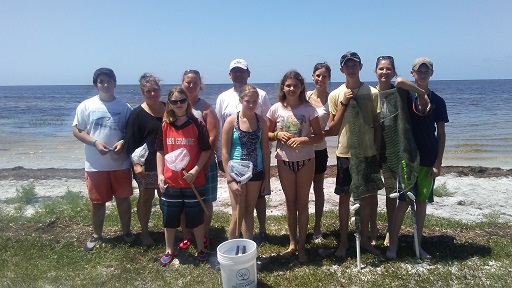
You can call the Taylor county extension office at (850) 838-3508 to find out more information on how you can set up one of these projects with your students
Is this something you might like?
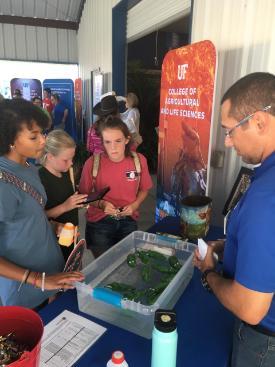 Do you enjoy learning about marine life? With 4-H you can
Do you enjoy learning about marine life? With 4-H you can
- Learn about all sorts of ocean life including sharks, crabs, corals, sea stars, sea turtles, manatees, dolphins, shorebirds, and much more!
- Investigate the different kinds of marine habitats in Florida, such as coral reefs, mangroves, salt marshes, and sandy beaches.
- Learn what marine scientists do and what other careers involve marine science.
- Visit aquariums and nature centers and participate in their education programs.
- Participate in a service-learning project and help the environment.
Here’s what you can do all year!
Starting Out Basic
- Visit a public aquarium or marine science center to learn more about marine life.
- Help your club plan a trip to a local beach.
- Investigate life on a sandy beach by going beachcombing with your family or club.
- Choose a marine animal to research and share what you learned with others.
- Read a story about a sea animal, then share the story with your club.
- Visit a sea turtle center and learn about them
Learning More Intermediate
- Investigate how fish are adapted for living in water.
- Investigate how sharks are different from other fish.
- Explore a marine habitat and identify the kinds of animals and plants that live there.
- Use a seine net to collect and identify shoreline animals.
- Visit a seafood market and learn about the fish we eat.
- Go on a sea turtle walk at night with your club and/or family.
- Learn about blue crabs and how to catch, cook, clean, and eat them!
Expanding Horizons Advanced
- Work with others to design an investigation of a coastal issue, habitat, or marine organism.
- Use the “earbones” of fish to determine their age.
- Use marine science tools to measure changes in an estuary or bay over time.
- Research and produce an action plan to improve a shoreline or coastal habitat.
- Learn how to set up and maintain a marine aquarium.
- Develop a game to teach others about marine life.
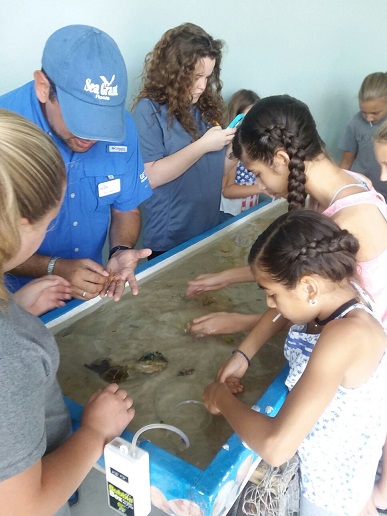
Expand Your Experiences in Marine Science!
- Work with members of your club to prepare for and enter the 4-H State Marine Ecology Event. Study materials and guidelines are available at florida4h.org/mee.
- Attend State Marine Camp and observe sea life underwater and in the camp's marine aquariums. More information at florida4h.org
- Enter the 4-H State Marine and Aquatic Photography Contest. More info at florida4h.org
- As a senior, attend 4-H University and give a demonstration or talk on a marine science topic, attend workshops, participate in community service events, hear keynotes, compete in contests, have fun, and meet other youth from across Florida who may share common interests. More info at florida4h.org.
- Investigate the kinds of careers that involve marine science and schedule a visit with those departments at the University of Florida ufl.edu/admissions//.
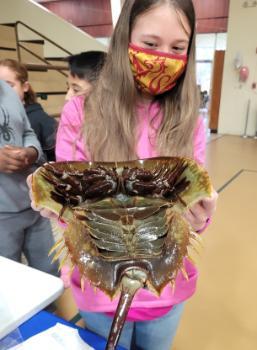
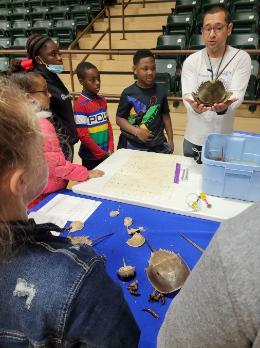
Resources
4-H Project Resources |
Connections and Events |
Record Keeping |
Awards and Recognition |
|---|---|---|---|
Project materials to assist youth in learning may be available through your county 4-H office or can be ordered directly from edis.ifas.ufl.edu.• Aquatic and Marine Ecosystems – Leaders Guide• Fins and Scales Project• Life in the Sea Member Manual• Wetlands Project• Starting and Maintaining a Marine Aquarium Available through National 4-H. Go to www.4-hmall.org.• There's No New Water• Science Discovery series |
Attending events and taking advantage of opportunities that expand your project learning will help you become the best you can be. Contact your county 4-H office.Attend these 4-H events:• State Marine Ecology Event• State Marine Camp• State Marine and Aquatic Photography Contest Check these and other statewide events out at .florida4h.org Apply for a Service Learning in Aquatic and Marine Education and Conservation (SLAMEC) mini-grant.For more info go to florida4h.org/mee. |
Learning to take good records of what you do and what you spend for your project is a 4-H life skill.The following record-keeping forms can help you keep a record of your activities. These forms can be found at Florida 4H.• Junior (ages 8-10)• Intermediate (ages 11-13) • Senior (ages 14-18)• Financial Summary• Member Portfolio (ages 8- 13) Specific project materials in marine science may have their own record forms, please check edis.ifas.ufl.edu. |
Florida’s Recognition Program involves feedback through:ParticipationSetting GoalsMeeting StandardsPeer CompetitionCooperationCertificates, pins, ribbons, trophies, trips and/or scholarships are awarded based on quality of performance at the county, district, state and national levels.To learn more about current recognition opportunities visit the Florida 4-H website at Florida 4H or contact your county 4-H agent |
Information received from the UF/IFAS EXTENSION FLORIDA 4-H PROJECT HANDOUT
CONTACT

Victor Blanco County Marine Agent (850) 838-3508 victorblancomar@ufl.edu
Victor is the Marine Science agent at the Taylor county extension office. In the past, he ran a marine science club for 4-H. He is also involved during the Cherry Lake Summer Camp, during Ag day with the schools, and he runs a 4-H Marine Summer Day Camp, that includes field days learning about coastal topics.
Step It Up!
Pass it on! Share what you learned in the project with others. Here are ideas to get you started!
Citizenship/ Leadership
- Present an idea for improving a marine habitat or shoreline.
- Help organize or participate in a beach or waterway clean-up with your club.
- Organize an event to get young kids excited about the ocean and through hands-on activities.
Science
- Conduct your own experiment on a marine science topic and share the results at a local science fair or other counties/state event.
- Be a citizen-scientist and help a marine scientist conduct his/her research.

